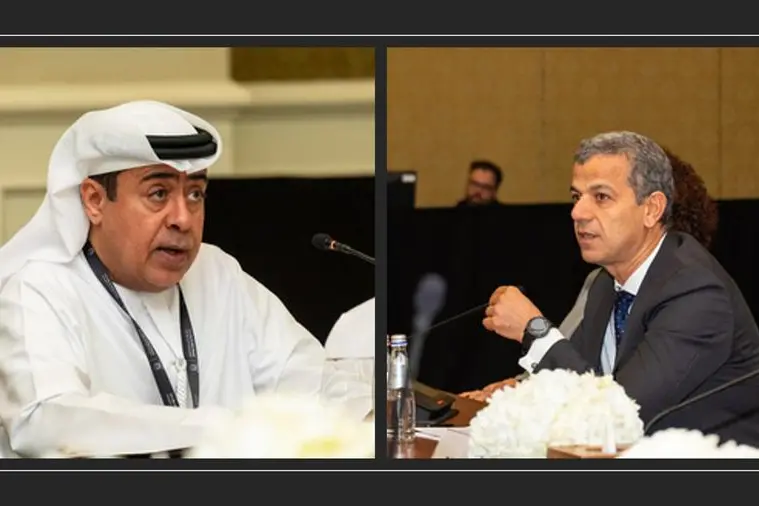PHOTO
Manama, Kingdom of Bahrain, Abu Dhabi, UAE | The General Council for Islamic Banks and Financial Institutions (CIBAFI), the global body for Islamic finance, organised a successful Pre-COP 28 Roundtable Meeting in Abu Dhabi and online, hosted by the Central Bank of UAE. Aligned with COP28, the roundtable aimed to facilitate dialogues on sustainability and climate change in Islamic finance, gathering representatives from IFIs, regulatory bodies, and sustainability advocates.
In a notable advancement, CIBAFI released an exposure draft for a new Greenhouse Gas (GHG) measurement tool, specifically tailored for Islamic Financial Institutions (IFIs). This release follows CIBAFI's earlier efforts in promoting sustainable development, including the publication of the CIBAFI Sustainability Guide, illustrating its continuous commitment to responsible financial practices.
The meeting was opened with remarks from Dr. Abdelilah Belatik, Secretary General of CIBAFI. Dr. Belatik emphasized the critical role of CIBAFI in integrating sustainable practices within Islamic finance. "Our initiatives, including the GHG measurement tool and the Sustainability Guide, align with the global pursuit of sustainability. The upcoming COP28 in UAE is an opportunity to demonstrate the MENA region's engagement in global sustainability efforts and the significant role Islamic finance plays in this context," he stated.
H.E. Ebrahim Al Zaabi, Assistant Governor for Monetary Policy and Financial Stability at the Central Bank of the UAE, gave a keynote address, highlighting the UAE's commitment to incorporating sustainability into its financial system " In an era with environmental challenges and the urgent need for sustainable development, the UAE remains committed to embrace innovative solutions that intertwine economic progress with environmental responsibility. Hosting COP 28 stands as a testament to the transformative power of forward-thinking initiatives that integrate sustainability principles into the fabric of our economic landscape.” he noted.
Mr. Rachid Ettaai, Business Development Manager at CIBAFI, presented details on the newly released GHG measurement tool. This tool represents a significant step towards understanding and managing the environmental impacts of Islamic financial institutions.
Following the presentation, two enlightening sessions featured a number of experts in the financial sector, including Dr. Mohamed Damak from S&P Global Ratings, Ms. Fatma Çinar from Türkiye's Participation Banks Association, Mr. Arshad Nuval bin Othman from CIMB Islamic Bank Malaysia, Mr. Noman Ali from HSBC Bank Middle East Limited, Mr. Riccardo Ambrosini of the International Finance Corporation, and Dr. Mohamed Wail from Al Maali Group.
The event concluded with CIBAFI reaffirming its commitment to promoting sustainable practices within the Islamic Financial Services Industry (IFSI), underscoring the importance of collaborative efforts in addressing climate change.
About CIBAFI:
The General Council for Islamic Banks and Financial Institutions is an international non-profit organization founded in 2001 by the Islamic Development Bank (IDB) and a number of leading Islamic financial institutions. It is an affiliated organ to the Organisation of Islamic Cooperation (OIC). With over 130 members from more than 34 jurisdictions all around the world, CIBAFI is recognized as a key piece in the international architecture of Islamic finance. Its mission is to support the Islamic financial services industry by providing specific activities and initiatives, aiming to strengthening the growth of the industry, deepening Shariah objectives in financial dealings and transactions, and facilitate cooperation between members and institutions of common interest. CIBAFI office is located at Jeera III, 7th Floor, Office 71, Building 657, Road 2811, Block 428, Manama, Kingdom of Bahrain.
For more information on CIBAFI, please contact:
CIBAFI Secretariat at Phone: +973 17357302, email: media@cibafi.org.
About the CBUAE
The CBUAE is the supervisory and regulatory authority of the banking and insurance sector.
The CBUAE promotes financial and monetary stability, efficiency and resilience in the financial system, and the protection of consumers through effective supervision that supports economic growth for the benefit of the UAE and its people.




















